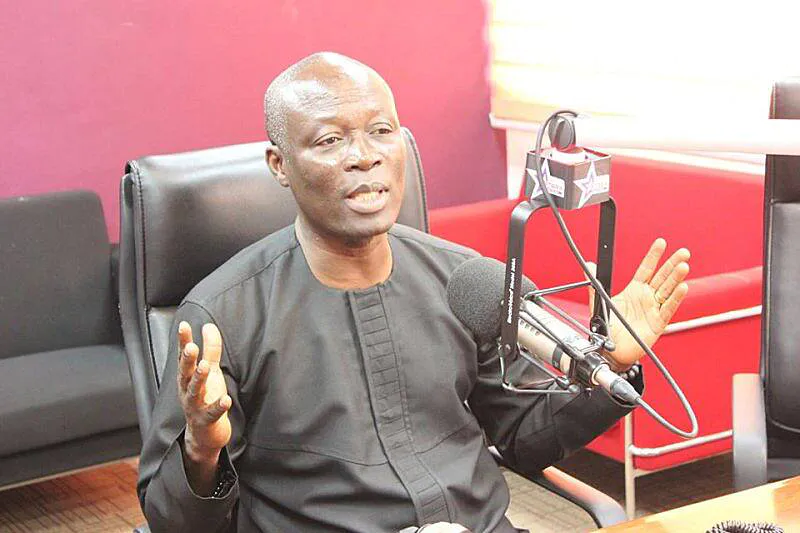Afenyo-Markin || NIB Operation to Arrest MP Ntim Fordjour Suspended After Minority Leader’s Intervention
Government Official Reveals Behind-the-Scenes Agreement in Parliamentary Security Standoff
The dramatic standoff between security officials and opposition parliamentarians took an unexpected turn yesterday when a high-ranking government official revealed the true reason behind the suspended arrest operation. What initially appeared as a parliamentary blockade against law enforcement was actually resolved through diplomatic back-channel negotiations, according to constitutional governance experts.
Minority Leader’s Appeal Halted Security Operation
Nii Lantey Vanderpuye, National Coordinator for the District Road Improvement Programme (DRIP), has clarified that Wednesday’s attempted arrest of Assin South MP Rev. John Ntim Fordjour wasn’t thwarted by opposition lawmakers as initially reported. Instead, the operation was suspended following a direct appeal from Minority Leader Alexander Afenyo-Markin.
“The operation was not suspended due to interference from the Minority in Parliament but rather through a request made by Minority Leader Alexander Afenyo-Markin,” Vanderpuye explained during an interview on Channel One TV’s Breakfast Daily on Thursday, April 10.
According to Vanderpuye, Afenyo-Markin pledged to voluntarily present Rev. Fordjour to national security officials today, April 10, at 10:00 a.m., effectively defusing what could have escalated into a prolonged confrontation, similar to previous parliamentary security tensions.
Serious Allegations Prompted NIB Action
The attempted arrest stemmed from explosive allegations made by Rev. Fordjour regarding suspicious activities at Ghana’s primary international gateway. Officials from the National Intelligence Bureau (NIB) had sought to question the Assin South MP, who also serves as Ranking Member on the Defence and Interior Committee of Parliament.
Fordjour had publicly raised concerns about two suspicious flights landing at Kotoka International Airport under circumstances he claimed suggested possible drug trafficking and money laundering operations. These allegations prompted the security response that led to NIB officials attempting to take the MP into custody, according to sources familiar with anti-narcotics operations.
Security Powers vs. Parliamentary Privilege
Speaking on the legality of the operation, Vanderpuye emphasized that NIB officials were acting within their authority when they approached the MP’s residence, citing Ghana’s Security and Intelligence Agencies Act.
“What they did yesterday was unruly and uncalled for, and a total disrespect for the security services. Talking of the warrant, a police officer can effect an arrest without a warrant,” Vanderpuye stressed during the interview, referencing standard law enforcement protocols.
His comments highlight the ongoing tension between parliamentary privilege and national security powers in Ghana’s constitutional framework, an issue that legal scholars have debated extensively.
Dramatic Standoff Could Have Continued
The government official revealed that without Afenyo-Markin’s intervention, the security operation would likely have continued through the night, potentially escalating what political analysts describe as an already tense situation.
“Had it not been for Afenyo-Markin’s assurance, the security operation would have continued with a possible overnight standoff at the MP’s residence,” Vanderpuye noted, suggesting that security officials were prepared for a prolonged confrontation similar to previous institutional standoffs.
When news of the NIB presence at Fordjour’s residence broke, opposition MPs quickly mobilized to the location, creating what parliamentary observers described as a tense atmosphere between elected officials and security personnel.
Expert Analysis on Constitutional Balance
This incident raises important questions about the balance of powers in Ghana’s democracy, according to constitutional experts. The tension between parliamentary immunity and security operations continues to challenge Ghana’s democratic institutions, as noted in recent governance studies.
“This case highlights the need for clearer protocols governing interactions between security agencies and parliamentarians,” notes Dr. Emmanuel Akwetey of the Institute for Democratic Governance (IDEG). “While MPs shouldn’t be above the law, proper procedures must be followed to respect constitutional separation of powers.”
What Happens Next?
All eyes will be on today’s scheduled meeting between Rev. Fordjour and national security officials. The outcome could set important precedents for how similar situations are handled in the future, according to parliamentary procedure analysts.
The case also raises broader questions about parliamentary oversight of security agencies and the appropriate channels for MPs to raise national security concerns without facing potential retribution, an issue frequently highlighted by democracy watchdogs.



